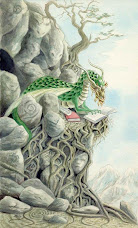I'm not a tarot expert. I am not a gifted psychic. I am self-taught at tarot and thought it would be fun to share with you how I learned tarot. There are much better teachers and tarot readers out there, but I think this is a good place for a beginner to get his or her feet wet. I've tried to create a very safe space for new readers who, like me, don't deal well with overly critical, know-it-all teachers who have no patience for those of us who need to learn at our own pace.
Speaking of patience, I have no patience for the history of tarot. There are hundreds of resources, probably thousands, that can give you that kind of information. If you want to know the history of tarot and how it came to be, you've come to the wrong place. If you want a practical, no-nonsense (well, maybe a little nonsense) introduction to using the tarot in your life, then you have found that place.
A lot of my suggestions, ideas, and theories fly in the face of what some tarot experts believe is right. And I may be dead wrong about a lot of things. But what is most important to me when learning tarot is demystification and the idea that there is no absolute truth about how the tarot should be used. Just because someone with certs out the wazoo says a thing is true, that is no reason to believe them. Test what you are told, don't swallow someone else's truth until you've seen it work for you as well and, even then, accept that truth as your truth, not THE truth. It's when we workers of these alternative tools for living and self-development start to believe that we know THE truth that we become downright dangerous.
I have few guidelines in my work and even fewer rules.
Guidelines:
Consistent shuffling style
Knowing in advance what my spread is going to be
Do what works and set aside what doesn't--no matter how much someone else insists that what doesn't work for me must work for me.
Be open to new or different ideas about the tarot
Try those things that didn't work for me before every now and again. After all, as we learn and grow, things we didn't or couldn't understand before may eventually come to work quite well for us.
If what you're doing isn't working, then change it.
Remember that the tarot does not speak truth, per se. It may offer insight, guidance, perspective, and sometimes very clear revelation, but its answers are never to be perceived as TRUTH. Even when those answers prove to be true later on down the road. Its answer are to be factored into our plans and decisions, but not to be that on which we base our decisions. Like any good oracle, the tarot, in my experience, has a tendency to reveal to me or those I'm reading for what I/they need to know right now, not necessarily what is true.
Rules:
Do no harm.
Carefully research every tarot deck I want before purchasing it.
There is no such thing as too many tarot decks.
Speaking of patience, I have no patience for the history of tarot. There are hundreds of resources, probably thousands, that can give you that kind of information. If you want to know the history of tarot and how it came to be, you've come to the wrong place. If you want a practical, no-nonsense (well, maybe a little nonsense) introduction to using the tarot in your life, then you have found that place.
A lot of my suggestions, ideas, and theories fly in the face of what some tarot experts believe is right. And I may be dead wrong about a lot of things. But what is most important to me when learning tarot is demystification and the idea that there is no absolute truth about how the tarot should be used. Just because someone with certs out the wazoo says a thing is true, that is no reason to believe them. Test what you are told, don't swallow someone else's truth until you've seen it work for you as well and, even then, accept that truth as your truth, not THE truth. It's when we workers of these alternative tools for living and self-development start to believe that we know THE truth that we become downright dangerous.
I have few guidelines in my work and even fewer rules.
Guidelines:
Consistent shuffling style
Knowing in advance what my spread is going to be
Do what works and set aside what doesn't--no matter how much someone else insists that what doesn't work for me must work for me.
Be open to new or different ideas about the tarot
Try those things that didn't work for me before every now and again. After all, as we learn and grow, things we didn't or couldn't understand before may eventually come to work quite well for us.
If what you're doing isn't working, then change it.
Remember that the tarot does not speak truth, per se. It may offer insight, guidance, perspective, and sometimes very clear revelation, but its answers are never to be perceived as TRUTH. Even when those answers prove to be true later on down the road. Its answer are to be factored into our plans and decisions, but not to be that on which we base our decisions. Like any good oracle, the tarot, in my experience, has a tendency to reveal to me or those I'm reading for what I/they need to know right now, not necessarily what is true.
Rules:
Do no harm.
Carefully research every tarot deck I want before purchasing it.
There is no such thing as too many tarot decks.












